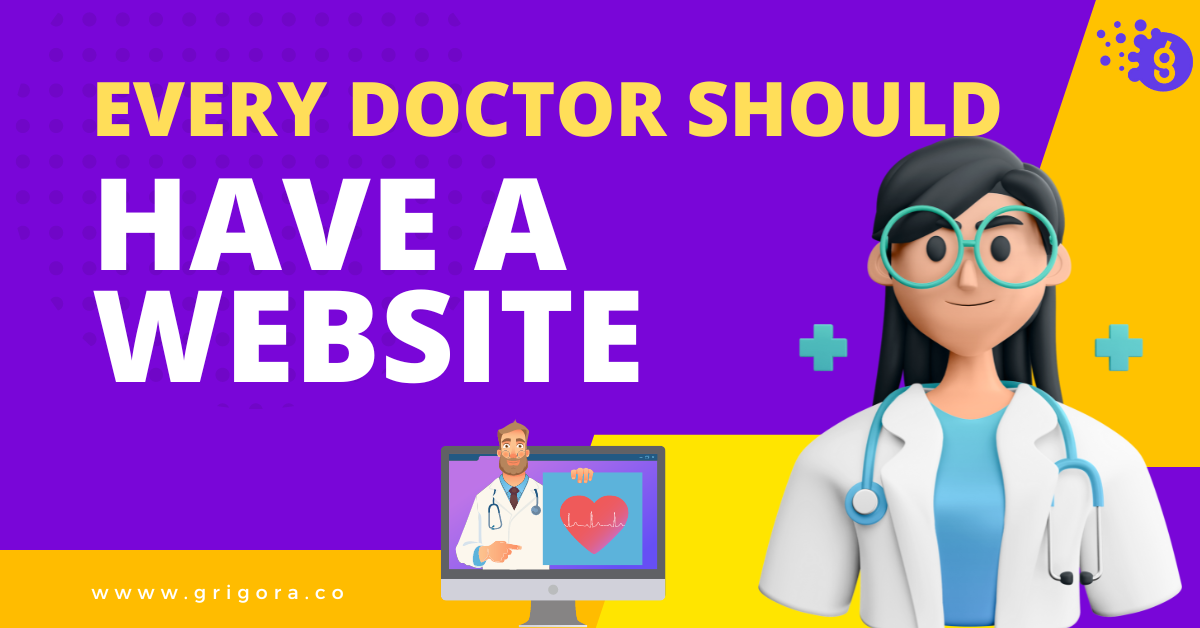In the world of healthcare, accessibility is not just about physical location; it's about information availability.
In today's digital era, a doctor's website is a crucial bridge, extending their reach beyond local limitations to a global audience. It offers 24/7 access to healthcare information and services, making medical guidance and resources available at any time, from anywhere. This constant availability not only improves patient care but also positions the doctor as a reliable and accessible healthcare provider in the digital age.
A website allows doctors to extend their reach beyond local boundaries, offering 24/7 access to their services and information, thereby providing enhanced patient care and accessibility globally.
Without further ado, let's delve into the 11 compelling reasons why having a website is essential for every doctor.
1. How a Doctor's Website Builds Professional Credibility

In the digital era, having a well-designed, visually appealing website is essential for establishing and enhancing a doctor's professional credibility. Such a website serves as a platform for doctors to showcase their qualifications, expertise, and experience, significantly contributing to building trust and confidence among potential and existing patients. The aesthetic appeal and functionality of the site play a crucial role in creating a positive first impression. Additionally, integrating patient testimonials and reviews into a visually engaging website adds a layer of authenticity and trustworthiness, further reinforcing the doctor's reputation and making it an indispensable tool in the healthcare professional's arsenal.
A well-designed website, with detailed professional profiles and genuine patient feedback, acts as a powerful tool in validating a doctor's expertise and reliability in their field. By highlighting their medical journey, specializations, and patient success stories, doctors can create a robust online presence that resonates with their audience's need for trustworthy healthcare information.
2. The Benefits of Telemedicine Integration on Doctor's Websites

In an era where digital healthcare is becoming the norm, integrating telemedicine services into a doctor’s website is a forward-thinking approach. This integration allows doctors to offer remote consultations, thereby enhancing accessibility and convenience for patients. With features like video consultations, online appointment scheduling, and digital prescriptions, a website becomes more than just an informational portal – it transforms into an active, virtual clinic.
Telemedicine services on a website cater to patients who may have mobility issues, live in remote areas, or prefer the convenience of online consultations. This aspect of a website not only modernizes the practice but also significantly improves patient care by making it more inclusive and accessible.
3. Enhancing Doctor-Patient Communication via Online Platforms
A doctor's website is a pivotal platform for enhancing patient communication and providing valuable health education. It allows doctors to share crucial health updates, informative blog posts, and educational material, establishing them as trusted authorities in their field. Interactive features like appointment bookings, efficiently managed on platforms like Grigora, greatly improve the patient experience. These tools make it convenient for patients to access care and stay informed. Regularly updating the website with relevant content fosters a strong community and a sense of trust between the doctor and their patients.
4. Effective Marketing Strategies for Medical Practices Online
In the realm of healthcare, a website is an invaluable asset for marketing and establishing a personal brand. Effective online marketing techniques like Search Engine Optimization (SEO) and content marketing are crucial for enhancing a medical practice's visibility on the internet. This strategic approach helps doctors to appear prominently in search engine results, attracting more patients and expanding their practice.
Developing a unique personal brand is equally important. A website allows doctors to differentiate themselves from others in the field, showcasing their unique approach to healthcare, philosophy, and areas of specialization. Personal branding through a website not only helps in attracting the right patient demographic but also establishes a strong, recognizable presence in the healthcare sector.
5. Streamlining Medical Practices: The Role of Websites in Operational Efficiency

A website significantly enhances operational efficiency in medical practice. Automating patient management through online tools not only streamlines appointment scheduling but also reduces the administrative burden. This includes managing patient records, appointments, and communication, all facilitated through the website's features. Platforms like Grigora offer tools that integrate these functions seamlessly, helping to organize and simplify practice management. This efficiency not only benefits the medical staff by reducing workload but also improves the patient experience by providing quick and easy access to medical services and information.
6. Staying Ahead in Digital Healthcare: Why Doctors Need Websites
In today's rapidly evolving healthcare landscape, having a website is crucial for doctors to stay competitive. Adapting to digital advancements is not just about keeping up with technological trends; it's about meeting the evolving expectations of modern patients. A website offers a platform for doctors to showcase their practice in a professional and accessible manner, which is increasingly what patients expect. This digital presence is essential for attracting new patients and retaining existing ones, as more people turn to online resources for healthcare information and services.
7. Leveraging Patient Feedback to Improve Medical Services

Incorporating patient feedback is crucial for the continuous improvement of medical practice. A website can be an effective platform for gathering patient insights through online surveys and feedback forms. This direct line of communication allows patients to share their experiences, concerns, and suggestions, providing valuable information for doctors to refine their services and patient care strategies.
Patient feedback collected via the website helps in identifying areas of excellence and aspects needing improvement. It also demonstrates to patients that their opinions are valued and considered, which strengthens the doctor-patient relationship. Leveraging this feedback, doctors can make data-driven decisions to enhance their practice's efficiency, patient satisfaction, and overall healthcare delivery.
8. Managing Online Reputation: A Guide for Doctors
In the age of digital healthcare, a doctor's online reputation is pivotal. A website is not just a digital representation but a critical tool for reputation management. It allows doctors to showcase their expertise, respond to patient feedback, and create a narrative that reflects the quality of their practice. Regularly updating the website with patient success stories, responses to reviews, and professional accomplishments helps maintain a positive and authoritative online presence. This proactive approach in managing and enhancing their online image is essential for building trust and credibility in the digital healthcare community.
9. Using Website Analytics to Tailor Patient Care
The use of website analytics can be a game-changer in tailoring healthcare delivery. By analyzing data on visitor behavior, doctors can gain insights into patient needs, preferences, and the most sought-after information. This understanding allows for customizing the patient experience on the website, ensuring that the content is relevant and engaging.
Analytics can reveal trends such as the most frequently read articles or the common queries made by patients. This information enables doctors to focus their efforts on areas of high patient interest or concern, ensuring that their website remains a valuable resource. By continuously monitoring and adapting based on these insights, doctors can enhance the effectiveness of their online presence and, by extension, the quality of care they provide.
10. Designing Patient-Friendly Medical Websites: Best Practices

In healthcare, the patient experience extends to the digital realm. A website's design plays a crucial role in how patients interact with a doctor's online presence. Responsive and accessible web design ensures that the website is user-friendly across various devices, crucial for patients who may have different accessibility needs. Additionally, tailoring the website's content and features to reflect specific medical services and the doctor's practice ethos can significantly enhance patient engagement. An intuitive, well-designed website makes it easier for patients to find information, book appointments, and interact with healthcare services, thereby improving overall patient satisfaction.
11. Maximizing Patient Education Through Doctor's Websites
A doctor's website can be a treasure trove of educational materials and health resources. Offering a repository for patient education – including health guides, informative articles, and FAQs – a website becomes an invaluable resource for patients seeking reliable and accessible health information.
The website can feature a range of content, from disease prevention tips to the latest medical research findings, all tailored to the doctor's specialties. This approach not only empowers patients with knowledge but also positions the doctor as a thought leader in their field. By regularly updating these resources, doctors ensure that their patients have access to the latest and most accurate health information.
Advantages of Custom Medical Websites
Custom medical websites offer a suite of benefits tailored to a doctor's specific needs and patient care approach. These websites not only enhance patient engagement but also provide a platform for personalized healthcare communication. Here's a table summarizing the key advantages:
| Feature | Advantage |
|---|---|
| Personalized Design | Reflects the unique brand and ethos of the medical practice. |
| Tailored Patient Interaction | Facilitates more personal and effective patient communication. |
| Data-Driven Insights | Allows for better understanding of patient needs and behavior. |
| Specialized Features | Includes specific functionalities like online consultations and patient education resources. |
| SEO Optimization | Custom sites are often better optimized for search engines, improving online visibility. |
| Enhanced Security | Custom websites can offer higher levels of data protection and patient privacy. |
Case Studies: Doctors Excelling with Personal Websites
Case Study 1: Dr. Alex Carrasco
Background: Dr. Alex Carrasco operates a wellness and integrative medicine practice.
Website Strategy:
Personal Branding: The website emphasizes Dr. Carrasco’s holistic approach to healthcare.
Content Focus: Rich in educational content, including blog posts on wellness and nutrition.
Patient Engagement: Features patient testimonials and an interactive appointment booking system.
Outcomes:
Increased patient inquiries and appointments.
Enhanced online visibility in integrative medicine.
Case Study 2: Dr. Karen R. Threlkel
Background: Dr. Karen R. Threlkel specializes in naturopathic medicine.
Website Strategy:
Professional Showcasing: Highlights her expertise in natural therapies and treatments.
Interactive Features: Includes a blog, health resources, and an online consultation booking feature.
SEO Optimization: Utilizes SEO best practices to rank for naturopathic medicine-related keywords.
Outcomes:
Strong online presence in the naturopathic community.
Attraction of patients seeking alternative medical treatments.
Case Study 3: Dr. Dale Prokupek
Background: Dr. Dale Prokupek focuses on internal medicine and gastroenterology.
Website Strategy:
Expertise Display: Showcases his specialized services in gastroenterology.
Educational Resource: Provides valuable information on gastrointestinal health.
Patient-Centric Design: Easy navigation, patient portal, and informative content.
Outcomes:
Recognition as a leading specialist in gastroenterology.
Improved patient education and engagement.
Selecting the Best Template Design for Medical Websites
For medical professionals aiming to make a striking online impression, selecting the best template design for their website is key. The ideal template should catch the eye of potential patients and be easy to find and navigate. Whether it's for a doctor's office, a clinic, or a hospital, the right template acts as the official digital front door to their practice.
A well-chosen template should feature:
User-Friendly Layouts: Prioritizing ease of navigation, allowing patients to effortlessly find important information or book appointments.
Integrated Patient Reviews: Showcasing ratings and reviews to build credibility and trust, especially important in America where patient choice is paramount.
Responsive Design: Ensuring the website looks great and functions well across all devices, essential for today's frontline healthcare providers.
Platforms like Grigora offer a selection of eye-catching templates tailored for the healthcare industry. Grigora's templates are not only visually appealing but also packed with features crucial for medical and hospital websites. Benefits of using Grigora include:
Medical-Focused Aesthetics: Templates that reflect the professionalism and compassion inherent in the healthcare field.
Seamless Functional Integration: Easily integrate essential features like online appointment booking and patient portals.
Continuous Support and Technological Updates: Keeping the website in line with the latest digital trends and requirements.
With the right template from Grigora, doctors can establish a website that not only meets their specific needs but also enhances patient interaction and showcases their services effectively. This is especially vital for medical professionals in America, where the competition and patient expectations are high. The ideal template will help any medical, clinic, or hospital website stand out and receive positive ratings and reviews from satisfied patients.
Navigating Legal and Ethical Considerations Online
When it comes to a medical website, navigating the legal and ethical considerations is of paramount importance. Ensuring patient privacy and data security is not just a legal requirement but an ethical obligation for doctors. The website must comply with healthcare regulations like HIPAA (Health Insurance Portability and Accountability Act) in the United States or similar legislation globally, ensuring all patient information is handled and stored securely.
Moreover, doctors must be vigilant about the accuracy and reliability of the information published on their website. Adhering to ethical guidelines, the content should be evidence-based and free from any misleading claims. This adherence builds trust and maintains the integrity of the medical profession in the digital space.
FAQs
Why is it important for doctors to have a website?
A website enhances a doctor's visibility, establishes credibility, and improves patient communication and education.
How does a website benefit a medical practice?
It streamlines operations, offers efficient patient management, and provides a platform for effective marketing and branding.
Can a website improve patient-doctor interactions?
Yes, through educational resources, interactive features, and personalized patient care information.
What are the SEO benefits for a doctor's website?
A website with good SEO increases online visibility, attracting more patients and expanding the practice's reach.
How does a website contribute to a doctor's reputation?
It allows doctors to manage their online presence, showcase their expertise, and build trust with patients.
Conclusion: Embracing Digital Advancements in Healthcare
In conclusion, the importance of a website for doctors in today's digital age cannot be overstated. From enhancing patient access and building professional credibility to improving operational efficiency and managing online reputation, a well-designed website is an indispensable tool. It reflects the doctor's commitment to providing accessible, modern healthcare services and staying abreast with technological advancements. As healthcare continues to evolve, a strong online presence will become increasingly crucial for medical professionals aiming to provide the best patient care and experience.



